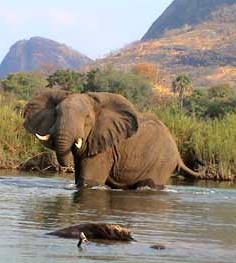|
Mozambique | Tanzania Travel - Leisure | Economy - Development First road links Tanzania, Mozambique
It is the least developed border in the region, despite both countries being members of Africa's most vital trade and political block, the Southern African Development Community (SADC). But Tanzania has its political and economic centre in the north, the south being sparsely populated. Vast Mozambique is opposite, with its centre in the far south and the north historically under-developed.
Security and immigration offices on both sides of the new border have yet to be finalised, but these are being constructed. President Kikwete suggested the installation of a one-stop-centre for travellers and traders, but no decisions have been made in that direction yet. More pressing is the road infrastructure leading to the new border crossing. In Tanzania, roads in the southernmost area, between Lindi and Mtwara, are in an acceptable state, but dirt roads from Mtwara to the border and the much longer distance from Lindi towards Dar es Salaam are in a very poor state. Tanzania has very limited infrastructure budgets, and there have been no government announcements regarding an upgrading of these key roads. In Mozambique, challenges are even greater, but there exist realistic plans to improve standards. Large investments have already been made in the country's 500-kilometres north-south road connection, including the recent inauguration of a bridge over Zambezi River, and some US$ 507 million in US aid funds are soon to be released for further upgrading of this connection. But for now, the northernmost 185 kilometres of Mozambique's north-south connection are among the country's worst dirt roads. During the rainy season, this road is almost impassable. President Guebuza nevertheless has concrete plans and funding to invest in this road, it was learned. Tourists, so far, in any way reach the increasingly popular region by plane. And currently, the poor roads fit the rough and pristine image northern Mozambique is marketing. Empty tropical paradise beaches, rough mountains and waters, roaming wildlife and oasis-like lodges - it is a setting that is suited well with challenging dirt roads. But developers and government have greater plans. The almost virgin region is already preparing for charter tourism, especially around the large Niassa Reserve. Infrastructure thus becomes a major challenge and the new Ruvuma bridge is key to further development. By staff writers © afrol News - Create an e-mail alert for Mozambique news - Create an e-mail alert for Tanzania news - Create an e-mail alert for Travel - Leisure news - Create an e-mail alert for Economy - Development news
On the Afrol News front page now
|
front page
| news
| countries
| archive
| currencies
| news alerts login
| about afrol News
| contact
| advertise
| español
©
afrol News.
Reproducing or buying afrol News' articles.
You can contact us at mail@afrol.com









